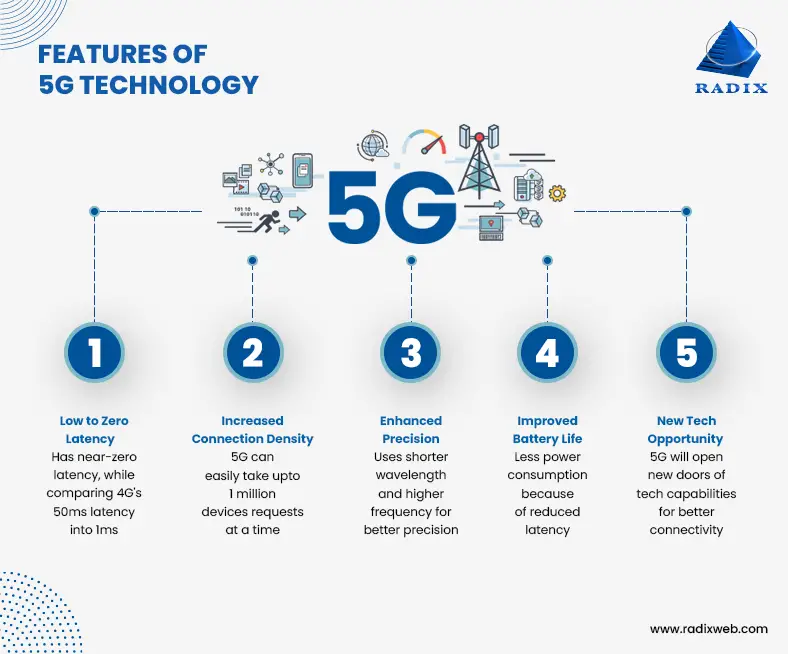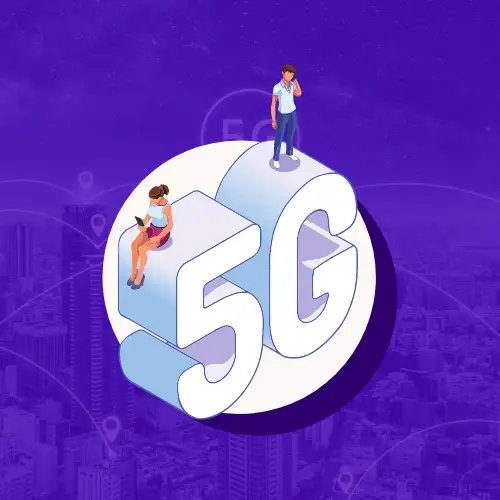The Impact of 5G on Mobile Development

The advent of 5G technology is set to revolutionize the mobile development landscape. With its lightning-fast speeds, ultra-low latency, and increased connectivity, 5G promises to unlock a plethora of new possibilities for mobile app developers.

Enhanced User Experiences

5G’s blazing-fast speeds will allow mobile apps to load and run faster than ever before. This will lead to a significant improvement in user experience, as apps will become more responsive and fluid. Additionally, the reduced latency of 5G will make real-time applications, such as video conferencing and gaming, more enjoyable and immersive.
Increased Connectivity
5G’s expanded bandwidth will enable more devices to connect to the internet simultaneously. This will facilitate the development of mobile applications that require a constant and reliable internet connection, such as IoT (Internet of Things) devices and telemedicine solutions.
New Applications and Services
The combination of 5G’s high speed and low latency opens up avenues for innovative mobile applications and services. Developers can now explore augmented reality (AR) and virtual reality (VR) applications, which require a high bandwidth and rapid data transfer rates. Additionally, 5G will enable the development of cloud-based mobile apps, which can be more efficient and cost-effective than traditional native apps.
Security and Privacy Considerations
While 5G offers significant benefits, it also raises security and privacy concerns. The increased connectivity and data transfer rates of 5G could make it more vulnerable to cyber-attacks. Developers must prioritize data encryption and robust security measures to ensure the privacy and security of user information.
Conclusion
5G is a game-changer for mobile development. Its transformative capabilities will not only enhance user experiences but also pave the way for new, innovative mobile applications and services. As 5G networks become more widespread, mobile app developers must adapt to embrace these technologies and harness their potential to deliver exceptional mobile experiences.## The Impact of 5G on Mobile Development
Executive Summary
5G technology has the potential to revolutionize mobile development and transform the way we use our mobile devices. With its ultra-fast speeds, low latency, and increased bandwidth, 5G will enable developers to create more immersive, interactive, and personalized mobile experiences. From augmented and virtual reality (AR/VR) to cloud gaming and autonomous vehicles, 5G will pave the way for innovative applications that were previously impossible.
Introduction
Mobile development is on the cusp of a transformative era as 5G technology rapidly gains traction worldwide. 5G holds immense promise for developers, promising to unleash a wave of innovative and groundbreaking mobile experiences. This article will delve into the profound impact of 5G on mobile development, exploring key subtopics and their implications for the future of mobile apps.
Enhanced Mobile Broadband
Description: 5G’s increased bandwidth and speeds will significantly enhance the user experience for mobile broadband services.
- Blazing-fast download speeds: Users will be able to download large files, stream high-quality video, and enjoy lightning-fast web browsing.
- Responsive real-time applications: Mobile apps will become more responsive and fluid, enabling seamless video conferencing, multiplayer gaming, and real-time data processing.
- Reliable and stable connections: 5G’s superior network reliability will ensure a more stable and consistent mobile broadband experience, even in crowded or congested areas.
Ultra-Reliable Low Latency Communications
Description: 5G’s ultra-low latency will enable near-instantaneous data transfer, paving the way for mission-critical applications and responsive mobile experiences.
- Real-time decision making: 5G’s low latency will support autonomous vehicles, drones, and other IoT devices that require real-time decision making and control.
- Immersive AR/VR experiences: Low latency will minimize delays, creating a more immersive and responsive AR/VR experience for users.
- Enhanced gaming experience: Mobile gaming will become more engaging and competitive with ultra-low latency, allowing for precise controls and real-time multiplayer interactions.
Massive Machine Type Communications
Description: 5G’s support for a massive number of connected devices will empower the Internet of Things (IoT), enabling a myriad of smart devices and applications.
- Smart cities and smart homes: 5G will connect millions of sensors and devices, enabling smart infrastructure, optimized energy consumption, and enhanced safety.
- Industrial automation: 5G’s reliable and low-power connectivity will facilitate remote monitoring, predictive maintenance, and automated processes in industrial settings.
- Connected healthcare: 5G will enable wearable devices, remote patient monitoring, and telemedicine services, improving healthcare accessibility and efficiency.
Network Slicing
Description: 5G’s network slicing capability allows operators to divide their networks into virtual slices, each tailored to specific applications and requirements.
- Tailored application performance: Network slicing enables developers to optimize network performance for specific apps, ensuring guaranteed bandwidth, latency, and security.
- Enhanced security: Virtual slices can be isolated from each other, providing enhanced security and data privacy for critical applications.
- Optimized resource allocation: Network slicing allows operators to allocate resources efficiently based on application requirements, improving network efficiency and cost optimization.
Edge Computing
Description: 5G complements edge computing by bringing processing and data storage closer to users, reducing latency and enhancing performance.
- Enhanced application responsiveness: Edge computing minimizes data transfer delays, providing a more responsive experience for mobile apps and services.
- Reduced network congestion: By processing data at the edge, edge computing reduces traffic on the core network, leading to smoother network performance.
- Personalized experiences: Edge computing enables the delivery of tailored and localized content and services to users based on their specific location and preferences.
Conclusion
5G technology holds the key to unlocking the next generation of mobile applications and experiences. Its transformative capabilities will empower developers to create more immersive, engaging, and innovative mobile apps than ever before. From seamless connectivity to real-time decision making, 5G will shape the future of mobile development and revolutionize the way we interact with our mobile devices.
Keyword Phrase Tags:
- 5G mobile development
- Enhanced mobile broadband
- Ultra-reliable low latency communications
- Massive machine type communications
- Edge computing

This is very interesting. I can’t wait to see how 5G will change the way we use mobile devices.
I’m not so sure about this 5G thing. It sounds like it could be dangerous.
5G is still in its early stages, but it has the potential to be a game-changer for mobile development.
I don’t think 5G is going to be as big of a deal as everyone is making it out to be.
I can’t wait to see how 5G will make my phone even more addictive.
Oh, great. Another way for me to waste my time on my phone.
I wonder if 5G will make my phone faster than a speeding bullet.
I’m excited to see how 5G will make the world a better place.
I’m afraid that 5G is going to be used for evil.
I think 5G has the potential to be both good and bad. It’s up to us to use it wisely.